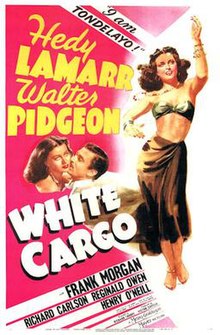White Cargo
| White Cargo | |
|---|---|

1942 US theatrical poster
|
|
| Directed by | Richard Thorpe |
| Produced by | Victor Saville |
| Written by | Leon Gordon |
| Starring |
Hedy Lamarr Walter Pidgeon |
| Music by | Bronislau Kaper |
| Cinematography | Harry Stradling Sr. |
| Edited by | Fredrick Y. Smith |
|
Production
company |
|
|
Release date
|
December 12, 1942 |
|
Running time
|
88 minutes |
| Country | United States |
| Language | English |
| Budget | $570,000 |
| Box office | $2,663,000 |
White Cargo (1942) is a film starring Hedy Lamarr and Walter Pidgeon and released by Metro-Goldwyn-Mayer. It is based on the 1923 London and Broadway hit play by Leon Gordon, which was in turn adapted from the novel Hell's Playground by Ida Vera Simonton. The play had already been made into a British part-talkie, also titled White Cargo, with Maurice Evans in 1929. The 1942 film, unlike the play, begins in what was then the present day, and uses a flashback technique.
Arriving by seaplane to inspect an isolated, but thriving rubber plantation in the African jungle during World War II, Worthing (Richard Ainley) reminisces about the old days, when conditions were much harsher. The film then flashes back to 1910.
The only four white men within hundreds of miles eagerly await the arrival of the riverboat Congo Queen. Wilbur Ashley (Bramwell Fletcher) and his boss, Harry Witzel (Pidgeon), have grown to hate each other. Ashley is finally going home, and the boat is also bringing his replacement, Langford (Richard Carlson), for a four-year stint. The other two white men are the alcoholic doctor (Frank Morgan) and missionary Reverend Dr. Roberts (Henry O'Neill).
Harry and Langford get off to a bad start, and it only goes downhill from there. It takes all of the efforts of the doctor and Roberts to keep the two men from each other's throat. The situation becomes worse when Tondelayo (Lamarr), a seductive native woman, returns. Harry, as resident magistrate, had already previously ordered her to leave his district as a disruptive, amoral influence.
...
Wikipedia
